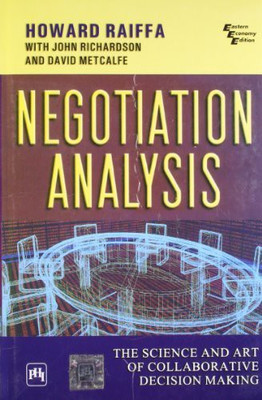Negotiation Analysis - The Science and Art of Collaborative Decision Making(English, Hardcover, Howard Raiffa)
Quick Overview
Product Price Comparison
The book "Negotiation Analysis" syn-thesizes four approaches to decision making, broadly conceived: individual decision analysis, judgemental decision making, game theory, and negotiation analysis. The book starts by considering how analytically minded parties can generate joint gains and distribute them equitably by negotiating with full, open, truthful exchanges. It then examines models that disengage step by step from that ideal. The book also shows how a neutral outsider (inventor) can help all negotiators by providing joint, neutral analysis of their problem. The book with analytical approach-building from simple hypothetical examples, can be understood by those with only a high school background in mathematics. This book has a broad relevance for both the theory and the practice of negotiation analysis as it is applied to disputes that range from those between family members, business partners, and business competitors to those involving labour and management, environmentalists and developers, and nations. The book pushes negotiation analysis to a higher level and should be required reading for all serious students and practitioners of negotiation and alternative disputes resolution. Table of Contents Preface Part I: Fundamentals- 1. Decision Perspectives. 2. Decision Analysis. 3. Behavioral Decision Theory. 4. Game Theory. 5. Negotiation Analysis. Part II: Two-Party Distributive (Win-Lose) Negotiations- 6. Elmtree House. 7. Distributive Negotiations: The Basic Problem. 8. Introducing Complexities: Uncertainty. 9. Introducing Complexities: Time. 10. Auctions and Bids. Part III: Two-Party Integrative (Win-Win) Negotiations- 11. Template Design. 12. Template Evaluation. 13. Template Analysis (I). 14. Template Analysis (II). 15. Behavioral Realities. 16. Noncooperative Others. Part IV: External Help- 17. Mostly Facilitation and Mediation. 18. Arbitration: Conventional and Nonconventional. 19. What is Fair? 20. Parallel Negotiations. Part V: Many Parties- 21. Group Decisions. 22. Consensus. 23. Coalitions. 24. Voting. 25. Pluralistic Parties. 26. Multiparty Interventions. 27. Social Dilemmas. References. Note on Sources. Index.


